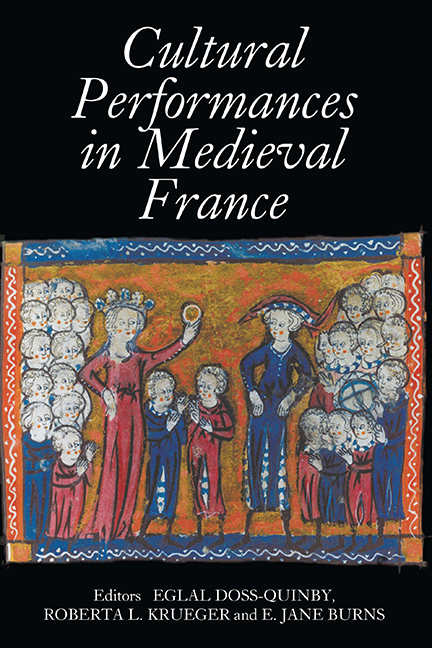Book contents
- Frontmatter
- Contents
- List of Illustrations
- Contributors
- Introduction
- Nancy Freeman Regalado, Curriculum Vitae
- PART I POETIC AND MUSICAL PERFORMANCES
- La poésie comme récit
- Colin Muset and Performance
- Subtilitas and Delectatio: Ne m'a pas oublié
- “Flables couvertes”: Poetry and Performance in the Fifteenth Century
- PART II PERFORMING SEXUAL AND SOCIAL IDENTITIES
- PART III DEVOTIONAL PRACTICE AND TEXTUAL PERFORMANCE
- PART IV PERSUASIVE PERFORMANCES
- PART V RE–ENACTMENTS AND LEGACIES
- Tabula Gratulatoria
- Tabula Gratulatoria
Colin Muset and Performance
from PART I - POETIC AND MUSICAL PERFORMANCES
Published online by Cambridge University Press: 24 October 2017
- Frontmatter
- Contents
- List of Illustrations
- Contributors
- Introduction
- Nancy Freeman Regalado, Curriculum Vitae
- PART I POETIC AND MUSICAL PERFORMANCES
- La poésie comme récit
- Colin Muset and Performance
- Subtilitas and Delectatio: Ne m'a pas oublié
- “Flables couvertes”: Poetry and Performance in the Fifteenth Century
- PART II PERFORMING SEXUAL AND SOCIAL IDENTITIES
- PART III DEVOTIONAL PRACTICE AND TEXTUAL PERFORMANCE
- PART IV PERSUASIVE PERFORMANCES
- PART V RE–ENACTMENTS AND LEGACIES
- Tabula Gratulatoria
- Tabula Gratulatoria
Summary
More than is commonly the case in the trouvère repertory, the songs attributable to Colin Muset ask to be understood in terms of performance. Nothing is more banal than a poem that begins, Chanter m'estuet (Gace Brulé, Blondel de Nesle, et al.), and even incipit expansions such as Onques maiz nus hom ne chanta / En la maniere que je chant (Never before has any man sung as I sing [Blondel de Nesle]) and J'ai souvent d'Amors chanté; / Oncore en chant (I have often sung of Love; I still sing of it [Gillebert de Berneville]) abound in the repertory. These references to singing, however, are effectively expressions of amorous sentiment rather than evocations of a performative activity, and the lyric persona that they project is far more clearly a lover than a musician. The case of Colin Muset is different. It is hard to read through the corpus of Colin's compositions without repeatedly sensing the primacy of the music-maker. The texts portray an itinerant entertainer; he is one who sings, moreover, not only about singing but also about playing instruments. There seem to be irregularities in his versification, but if we find the meter and homophony somewhat problematic, it is only until we have matched text to melody and recognized the reality of a vocal rendition; likewise, the freedom of live performance explains apparently missing or supernumerary lines of poetry. My intention is to examine various traits of Colin's lyrics that point to the essentiality of performance.
The very name Muset, of course, a sobriquet, suggests nothing less. It is the witty outcome of an historically unclear intertwining of two or three etymological strings, one from Latin mus, another also from Latin but ultimately from Greek mousa, a third perhaps of Celtic origin. Together they come to produce in Old French both a cluster of words that evoke pleasure and amusement and a family of terms having to do with music. The form muset itself evidently means a tune played on the instrument known as a musette and, by extension, a song, or the words set to that tune. That is what Colin seems to mean in the phrase, Si li ai chanté le muset / Par grant amour (And out of great love I sang her the song). At the same time, the word carries resonances of lightness and gayety.
- Type
- Chapter
- Information
- Cultural Performances in Medieval FranceEssays in Honor of Nancy Freeman Regalado, pp. 15 - 24Publisher: Boydell & BrewerPrint publication year: 2007

